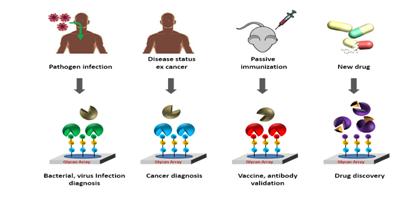
The main thrust of this division is to developchemical and biological approaches to solveproblems in living systems. Current researchprograms include mechanism-based andstructure-based drug discoveries, developmentof high-throughput systems to facilitate theprocess, design of new carbohydrate andother molecular probes for imaging and glycoproteomicanalysis, nano- and micro-fabricationof carbohydrates for the high-throughputanalysis of biomolecular interactions, anddevelopment of new reactions and methods ofinterest to functional genomic study and drugdiscoveries. In addition, study of functionalgenomics is another emphasis. Someefforts are directed toward identification andvalidation of important targets associated withcancer and infection, and protein misfoldingdiseases, and understanding of the functionof these targets at the molecular level. Usingthe state-of-the-art mass spectrometry, NMR,and X-ray crystallography as well as othergenomic and proteomic approaches, thedivision is developing new strategies to tacklethe problems of protein folding, structureand function, especially that of membraneglycoproteins and intracellular proteinsassociated with cancer, infectious diseasesand the immune system.
The following subjects are of current interest.
• Membrane protein: structure-functionstudy and drug design. Transglycosylase,hemagglutinin, neuraminidase and otherglycoprotein markers on bacteria, virusesand cancer cells.
• Carbohydrate chemistry and biology: Newsynthetic chemistry, glycan sequencing,glycan arrays for analysis of sugar-proteininteraction, sugar-based drug discovery andvaccine design.
• High-throughput screening and drugdiscovery: Development of diverse structurespace and assays for target-based andcell-based screen, e.g., transglycosylaseof MRSA and XDR-TB, HCV protease,influenza, breast cancer, and directedevolution of enzymes for biofuel synthesis.
• Modification of biomolecules and proteindesign: Protein design by computationand phage-display: high-order structures,human antibody library. Synthetic biologyand natural product chemistry: synthesis ofnew antibiotics, biofuels and other bioactivemolecules. Protein misfolding and diseaseprogression.
• Post-translational glycosylation and epigenetic regulation: Glycoproteinsynthesis, human antibody, and vaccinedesign. Probing the effect of glycosylationon protein structure and function. Chromatinmethylation and demethylation associatedwith cancer and viral diseases.
This division will continue its long-term planin the discovery and development of newchemistry and technology to solve emergingscientific, medical, and biotech problems.The middle-term efforts are devoted to thefollowing areas: (1) solving technology hurdlesin glycomics research, i.e. glycan synthesis,sequencing, and analysis, (2) tackling theproblems of infectious diseases, in particular,influenza, HCV, and drug resistant bacteria,such as MRSA and TB, (3) development ofnew probes for biomarker discovery in cancerand cancer stem cells and novel vaccinedevelopment, (4) identification of noveltherapeutic components from natural products,(5) drug discovery using the ultra-HTSsystem, and (6) functional proteomics – studyof structure, folding, function (in vitro and invivo), mechanisms, modifications (methylation, phosphorylation and glycosylation) ,interactions, and therapeutic application.In addition to pursuing new chemistry andtechnology discovery, the division is intendedto translate important discoveries into diseasediagnosis, vaccines, and drug developments.
Division Director :
Dr. Che Alex Ma
Members(ordered by English last names)
Professors:
Dr. Yun-Ru Ruby Chen
Dr. Wei-Chieh Cheng
Dr. Shang-Cheng Hung
Dr. Li-Jung Juan
Dr. Tsung-Lin Li
Dr. Su-Chang Lin
Dr. Chi-Huey, Wong
Research Specialists:
Dr. Chi-Fon Chang
Dr. Ting-Jen R Cheng
Dr. Tsui-Ling Hsu
Dr. Chien-Tai Ren
Dr. Ying-Ta Wu
Dr. Wen-Bin Yang
Dr. Hui-Ming Yu

